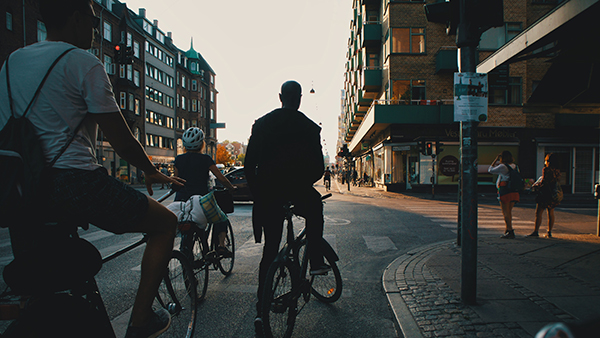No excuses: accelerate the transformation of urban mobility ecosystems

The urban mobility revolution is under way. The transport sector has long been an underachiever in the fight against climate change – accounting for 30% of EU greenhouse gas emissions despite its enormous decarbonisation potential thanks to current technologies. Accelerating the transition towards sustainable urban mobility will generate immediate socio-economic benefits.
Air pollution is a major cause of premature death and is the largest environmental health risk in Europe, according to the European Environment Agency. Furthermore, car-centric cities are extremely noisy. To put this into context, 55 decibels is the average noise level deemed acceptable by the WHO; a staggering 55% of Europeans, however, live in places louder than that. This is a major contributing factor to heart disease, hypertension, high stress levels, faster cognitive decline, and obesity – further compounded by poor sleep quality.
The Covid-19 pandemic offered a window to city administrations to rethink urban planning and shift the focus towards the health and wellbeing of citizens. Consequently, new pedestrian areas and cycling lanes sprung up like mushrooms – eight EU cities now make up the top 10 in the Global Bicycle Cities Index 2022. However, the pace of this transition is still too slow: low-emissions zones, charging infrastructure for alternative fuels as well investments in efficient mass transit remain lagging in most large and medium cities. Meanwhile, the clock ticks on.
Expanding mass transit systems is expensive, as is increasing the capacity of vehicle infrastructure. New metro lines take years to build, and the process comes at the price of major disruption. How can local administrators nudge citizens and businesses towards more sustainable, rational, and low-impact mobility patterns? The answer is manifold and relies on ambitious, constructive actions from the public and private side.
Invest in all transport modes and avoid perverse incentives
Despite increased enthusiasm for cycling, in a city like Brussels more than 70% of urban public space is dedicated to cars. Favourable taxation for company cars is but one of the many illogical incentives that give rise to car-centric cities. This has negative consequences for both ridership and profitability of public transport, and also impacts the availability of cycling infrastructure. For a start, recognising cycling as a mode of transport in and of itself would help in diversifying infrastructure, reduce overall congestion, and offer a greener alternative for both individual mobility and last-mile logistics. In Brussels alone, cargo bikes have the capacity to carry out half of urban deliveries. A bolder reform of circulation plans in cities is one of the low hanging fruits: the physical separation of pedestrian, bike, and motor traffic would yield safer roads and smoother flows for all road users.
Multi-governance is a must
EU regulatory and non-regulatory initiatives are setting the right ambition levels for greater use of renewable energy in transport, for better air quality standards, and coherent urban mobility plans across the continent. Many stakeholders, however, are calling on Brussels to do more to harmonise infrastructure deployment and local traffic restrictions based on noise and pollutant emissions. While cities and regions are testing innovative economic models and running local projects, the new EU Urban Mobility Framework will hopefully bring more coherence and provide certainty to businesses operating across borders. A new approach to multi-level governance for urban mobility is coming and will only be beneficial. It will help disseminate best practices and success stories, too.
The human factor
A new approach to sustainable urban mobility must help bridge the socioeconomic gap. It must be fairer, safer, more accessible, and more affordable for all. Measures such as ending sales of petrol and diesel cars by 2035 need to be rebalanced by local action too. Arguably, urban populations are already moving away from the traditional car ownership model. The right incentives and policies must help all citizens to capitalise on this transformation, as a less car-centric approach will increase social autonomy and inclusion of the least advanced members of our urban social fabric.
A fair transition will also offer better jobs and a healthier working environment. The need for different, advanced skills is already emerging as start-ups and ambitious entrepreneurs are rethinking business models in the urban environment, providing better services and many high-quality jobs.
At FleishmanHillard, we want to stimulate the debate on all things sustainable mobility, and we always strive to learn more. In September, we held a first roundtable to discuss innovative ideas to accelerate the “Transition to Emissions-Free and Greener Cities”. We are particularly thankful to Stéphanie Lepczynski (Région de Bruxelles Capitale), Jill Warren (European Cyclists’ Federation), Renaud Sarrazin (Urbike), Eoghan Griffin (Meta), Jack Berringer (INGKA) and Robin Loos (BEUC) for their invaluable insights.
-

With 15 years of experience in sustainability, strategy, advocacy and communications, Coline joined FleishmanHillard in 2022 as Vice President and Associate Director to lead the Environment and Chemicals team. She specializes in circular economy and environment policies, advising clients advocacy campaigns and government relations practice....
Find Out More
-
Generative AI is changing the search game
May 8, 2025
-
The challenges facing Europe and European leaders at Davos 2025
January 24, 2025



